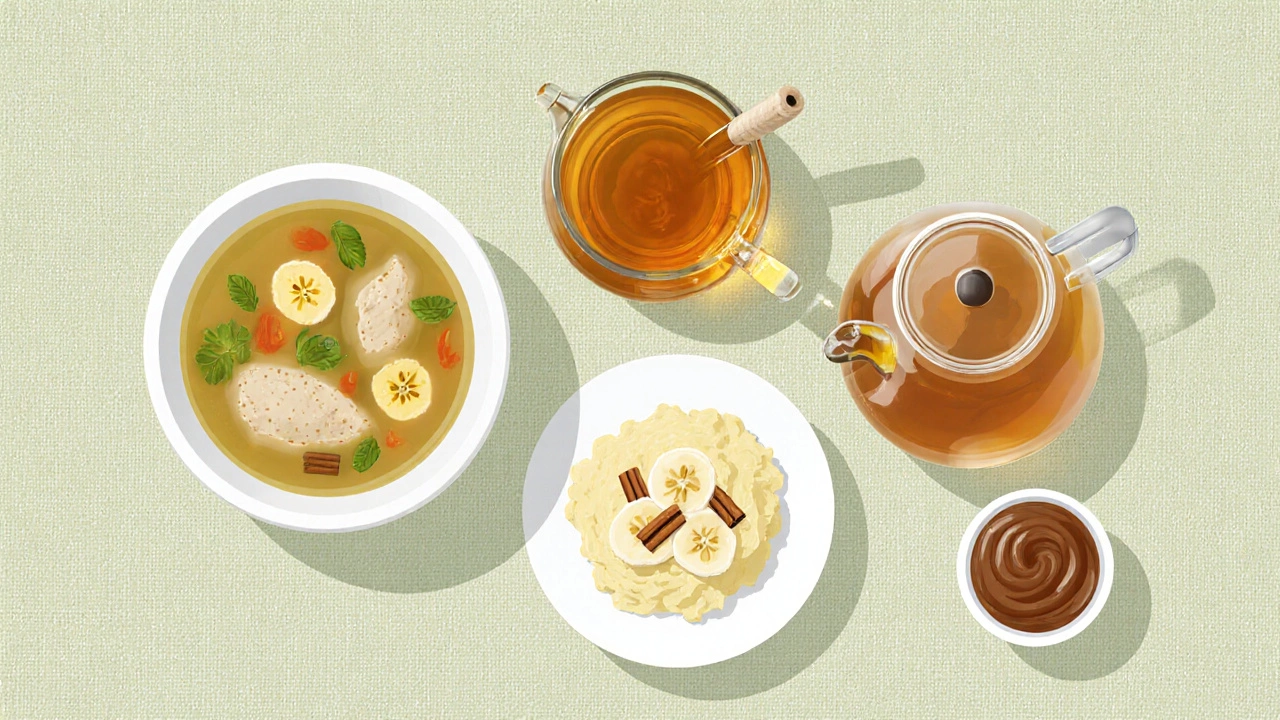Comfort Food Finder
What are you feeling?
Select up to 3 symptoms for personalized comfort food recommendations:
Your Perfect Match
is ideal for your symptoms
Why this works:
When you’re under the weather, the right comfort food can turn a miserable day into a cozy, restorative one. It’s not just about taste - the right dish can hydrate, deliver gentle nutrients, and lift your mood without taxing a weakened system.
Why Certain Comfort Foods Work When You’re Sick
Comfort food is a type of dish that combines familiar flavors, soft textures, and easy digestion to calm both body and mind. Warm liquids boost circulation, mild spices can clear sinuses, and starchy bases provide steady energy. Below are the key qualities that make a dish ideal for a sick day:
- Warmth: Heat increases blood flow, helping immune cells move faster.
- Hydration: Broths and teas replace fluids lost through fever or a runny nose.
- Gentle nutrients: Easily digestible carbs, lean protein, and soothing herbs support recovery without upsetting the stomach.
- Familiarity: Familiar flavors trigger positive memories, lowering stress hormones.
Top 5 Classic Comfort Foods for Sick Days
Here are the most effective dishes, each with a quick, step‑by‑step recipe that can be whipped up in 30 minutes or less.
1. Classic Chicken Soup
Chicken soup is a nutrient‑dense broth packed with protein, electrolytes, and anti‑inflammatory compounds. It’s been shown in several clinical studies to shorten the duration of the common cold.
- Sautee 1 diced carrot, 1 diced celery stalk, and ½ chopped onion in 1 tbsp olive oil until soft (5 min).
- Add 1 lb bone‑in chicken thighs, 6 cups low‑sodium chicken broth, and a pinch of thyme.
- Simmer for 20 min, then shred the chicken and discard the bones.
- Season with salt, pepper, and a squeeze of lemon juice for extra Vitamin C.
2. Soothing Ginger Tea
Ginger tea provides warming heat and gingerol, a compound that eases nausea and reduces inflammation. Perfect for sore throats and queasy stomachs.
- Slice 2 cm of fresh ginger root.
- Boil 2 cups of water, add the ginger, and steep for 10 min.
- Stir in 1 tsp honey and a splash of lemon juice.
3. Creamy Mashed Potatoes
Mashed potatoes are soft, easy to swallow, and provide a steady release of carbohydrates. Add a bit of dairy for calcium or a dairy‑free alternative for extra comfort.
- Peel and cube 2 lb potatoes; boil until fork‑tender (15 min).
- Drain and mash with ¼ cup milk (or oat milk), 2 tbsp butter, and a pinch of salt.
- Optional: stir in roasted garlic for immune‑boosting allicin.
4. Gentle Oatmeal
Oatmeal supplies soluble fiber, which can help regulate digestion and keep blood sugar stable. It’s also a nice vehicle for soothing toppings.
- Combine ½ cup rolled oats with 1 cup water or milk; simmer 5 min.
- Top with sliced banana, a drizzle of honey, and a pinch of cinnamon.
5. Apple Sauce
Apple sauce offers gentle sweetness, pectin for gut health, and a comforting aroma. Ideal for those who can’t handle solid foods.
- Peel and dice 3 apples; simmer with ¼ cup water and a dash of nutmeg.
- Cook until soft, then blend to desired consistency.
Adapting Comfort Foods for Dietary Needs
Not everyone can enjoy the classic versions. Below are simple swaps that keep the soothing effect while respecting dietary restrictions.
- Vegan: Replace chicken with simmered lentils or shredded jackfruit in the soup; use plant‑based milks for mashed potatoes and oatmeal.
- Gluten‑free: All listed recipes are naturally gluten‑free, but double‑check broth labels.
- Dairy‑free: Use coconut oil or olive oil instead of butter; select oat or almond milk for creamy textures.

Quick Prep Tips & Storage Hacks
When illness strikes, time and energy are limited. These tricks help you get soothing meals on the table fast.
- Batch‑cook broth: Prepare a large pot of chicken or vegetable broth on the weekend, freeze in 2‑cup portions.
- Pre‑chop veggies: Store diced carrots, celery, and onions in airtight containers for instant sauté.
- Use the microwave: For mashed potatoes, steam a potato, then mash with milk and butter in a mug - ready in 5 min.
- Reheat gently: Over‑heating can destroy beneficial compounds in ginger tea; warm on low heat.
Comfort Food Checklist for Sick Days
| Food | Warmth | Hydration | Gentle Nutrients | Best Symptom |
|---|---|---|---|---|
| Chicken Soup | High | High | Protein, electrolytes | Congestion, fatigue |
| Ginger Tea | Medium | Medium | Anti‑nausea compounds | Nausea, sore throat |
| Mashed Potatoes | Medium | Low | Carbs, calcium | Weakness, stomach upset |
| Oatmeal | Low | Low | Fiber, B‑vitamins | Energy dip, digestion |
| Apple Sauce | Low | Low | Pectin, vitamin C | Sore throat, appetite loss |

Mini FAQ - Your Burning Questions Answered
Can I eat comfort food if I have a fever?
Yes. Choose dishes that are easy on the stomach, like chicken soup or oatmeal. Avoid heavy, fried foods that can raise body temperature further.
Is honey safe in ginger tea for children?
Honey is fine for kids over one year old. It adds soothing texture and antibacterial benefits. For infants, use plain boiled water with a slice of ginger.
How long can I store homemade broth?
In the fridge, keep it up to 4 days; frozen, it lasts 3 months. Label each container with the date to avoid waste.
What’s a good vegan alternative to chicken soup?
Simmer lentils, diced carrots, celery, and shiitake mushrooms in vegetable broth. Add a splash of soy sauce for umami depth.
Can spicy foods help clear a stuffy nose?
A little heat, like a pinch of cayenne in soup, can promote mucus drainage. Keep it mild so it doesn’t irritate a sore throat.
Wrapping Up: Your Go‑To Sick‑Day Menu
When you’re under the weather, the best comfort food is the one that hydrates, fuels gently, and feels familiar. Keep a few staples - broth, ginger, soft carbs, and fruit purées - on hand, and you’ll be ready to nourish yourself without a trip to the pharmacy.

